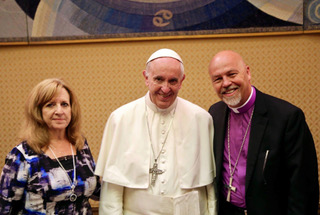The idea of living in continuity is summed up in the one word “Tradition.” “We can not change the everlasting boundaries which our fathers have set, but we keep the Tradition, just as we received it,” wrote John of Damascus. These are words that contempory Christians must contemplate.
There is a wonderful new sense that we must recover the Tradition of our fathers. I have been engaged in that conversation for a number of years, but recently have sensed a new generation of hungry people. The question over what the word ‘Tradition’ means is always an important one.
It is commonly understood to signify an opinion, belief or custom that is passed down from one generation to another. However, I believe that it means something far more significant in Christianity. Traditions speaks of the Bible, the Creeds, the Councils, the writings of the early Fathers and the whole system of doctrine, government, worship, spirituality, and the wonderful beauty or art of the church. Christians must see themselves as heirs too and guardians of the rich inheritance they have received from the past and they must transmit this inheritance undistorted to future believers.
Just to be clear, not all things that are received from the past are of equal value, nor are all things from the past necessarily true. “The Lord said, I am truth. He did not say, I am custom,” was the remark from the Council of Carthage in 257. Let’s clarify that there is a difference between ‘Tradition’ and ‘traditions’: many traditions that are passed down are human and accidental opinions (some good and some bad), but not a true part of the Great Tradition or the fundamental Christian message.
We are not called to simply apply ‘Tradition’ in a mechanical or automatic way. If we are to truly contemplate ‘Tradition’ we must enter into it. We do not “do” ‘Tradition’; but rather ‘Tradition’ will “do” us, (or undo as the case may be).
‘Tradition’ is life in the Holy Spirit, it is not a mere event, that has occured, but it is a “living experience.” It is not a dead acceptance of some past thing, but rather a living discovery of the Presence of God in the midst of this life.
‘Tradition’ never changes (because God never changes), but it is constantly assuming new forms which speak to new generations of believers who are seeking to be embraced by ‘Tradition.’
Tradition is the witness of the Spirit; the Spirit’s unceasing revelation … we must be concious of the grace-giving presence of the Lord in it; we must feel the breath of the Holy Ghost in it …. Tradition is the constant abiding of the Spirit and not only the memory of words. (Georges Florovsky). Or in the words of Christ: “When the Spirit of truth has come, He will guide you into all truth.” (John 16:13)
I am so encouraged by the conversation about “Tradition,” because it is what will guard the “faith” and protect it from a culture that wants to make God in it’s image.


